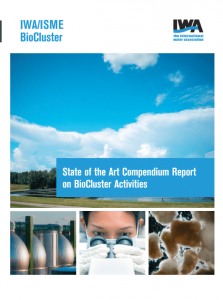The BioCluster Compendium presents an overview of ground-breaking developments and novel technologies in microbial ecology, and their potential application in solving issues of sustainability, environmental quality, dwindling resources, health and climate change. The report provides examples where microbial ecology and biotechnology have already shown promising results in the areas of public health and sanitation, wastewater management, resource recovery and industrial wastewater, and provides some suggestions on future trends in these fields. It will serve as a roadmap for IWA/ISME’s BioCluster and for its activities.
– Good drinking water distribution systems (DWDSs) are key to public health. Most problems in DWDSs are microbial in nature, primarily biofilms, nitrification, bio-corrosion and pathogen persistence. The report provides a better understanding of the diverse microbial life that exists in DWDSs, and examples of studies to better manage drinking water systems.
– According to UNESCO only 20% of wastewater receives proper treatment globally. As such, there is a pressing need to develop cost-effective and efficient systems to better handle wastewater. The report compiles advances in biotechnology that support the development of sustainable practices in wastewater management.
– Resource recovery from wastewater systems is more globally recognised, with rapid developments in methane and biogas production and new initiatives in bioplastics, medium-chain fatty acids and microalgae. The report covers novel methods available in microbial ecology for the recovery of a variety of resources from municipal wastewater streams.
– The report also looks into several chemical and biological processes to treat industrial wastewater, and provides insights for optimisation.


